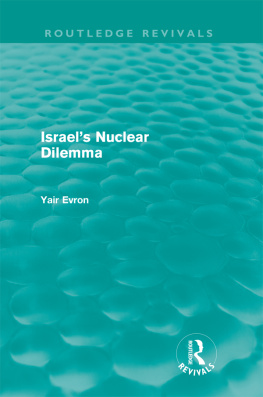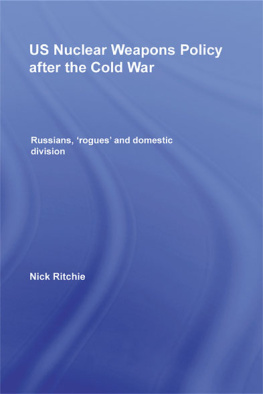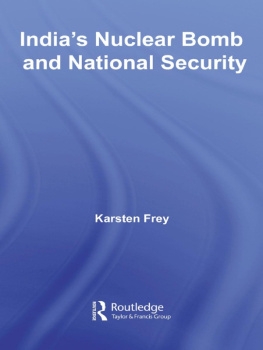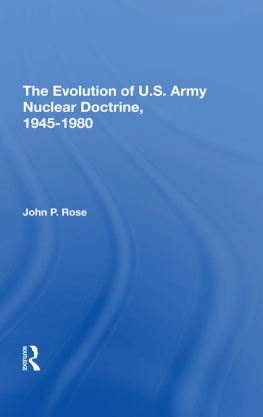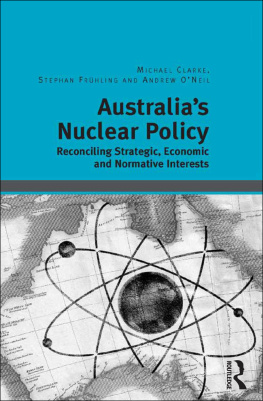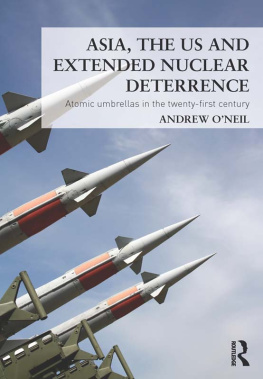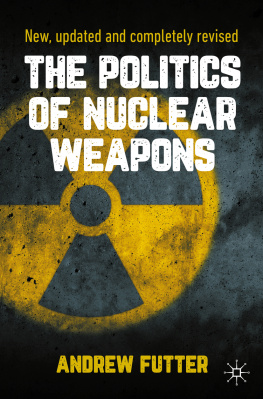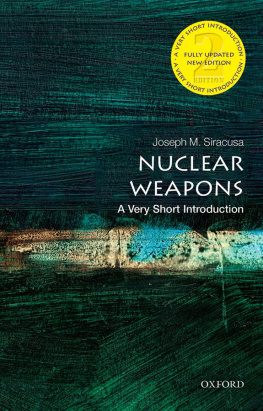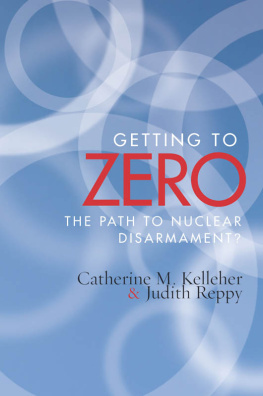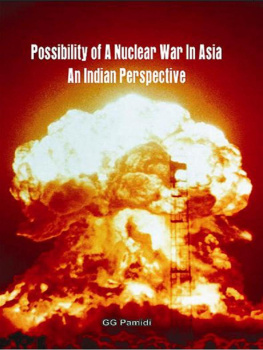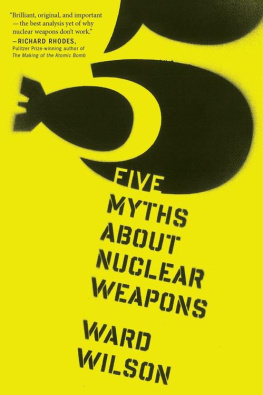Routledge Revivals
Israel's Nuclear Dilemma
Originally published in 1994, Yair Evron opens the book with an account of the development of Israel's nuclear doctrine and the internal disagreements within the Israeli political and strategic elite over how nuclear policy should be conducted. There follows an analysis of the reactions from Arab states and of how, with the exception of Iraq, they have so far refrained from developing their own nuclear weapons.
Israel's Nuclear Dilemma
Yair Evron
First published in 1994
by Routledge
This edition first published in 2011 by Routledge
2 Park Square, Milton Park, Abingdon, Oxon, OX14 4RN
Simultaneously published in the USA and Canada
by Routledge
270 Madison Avenue, New York, NY 10016
Routledge is an imprint of the Taylor & Francis Group, an informa business
1994 Yair Evron
All rights reserved. No part of this book may be reprinted or reproduced or utilised in any form or by any electronic, mechanical, or other means, now known or hereafter invented, including photocopying and recording, or in any information storage or retrieval system, without permission in writing from the publishers.
Publisher's Note
The publisher has gone to great lengths to ensure the quality of this reprint but points out that some imperfections in the original copies may be apparent.
Disclaimer
The publisher has made every effort to trace copyright holders and welcomes correspondence from those they have been unable to contact.
A Library of Congress record exists under LC Control Number: 93042628
ISBN 13: 978-0-415-60904-3 (hbk)
ISBN 13: 978-0-415-60905-0 (pbk)
ISRAEL'S NUCLEAR DILEMMA
ISRAEL'S NUCLEAR DILEMMA
Yair Evron
To Ruti and Roi
First published 1994
by Routledge
11 New Fetter Lane, London EC4P 4EE
1994 Yair Evron
Phototypeset in Baskerville by Intype, London
Printed and bound in Great Britain by T.J. Press (Padstow) Ltd, Padstow, Cornwall
Printed on acid free paper
All rights reserved. No part of this book may be reprinted
or reproduced or utilized in any form or by any
electronic, mechanical, or other means, now known or
hereafter invented, including photocopying and
recording, or in any information storage or retrieval
system, without permission in writing from the
publishers.
British Library Cataloguing in Publication Data
A catalogue record for this book is available from the British Library
ISBN 0-415-10832-2
CONTENTS
The nuclear issue in the Middle East has become increasingly more salient. Significant since the 1970s, it attained much more visibility during the Gulf Crisis and War and its aftermath. While several academic works have already dealt with various aspects of proliferation in the Middle East, a great deal is still open to analysis.
This book deals with Middle Eastern proliferation in general (to be specified below), and with some of the dimensions of Israel's nuclear policy in particular. My method here has been to present an historical-analytical investigation grounded in various theoretical frameworks, primarily that of deterrence theory, followed by an analytical and theoretical discussion of the possible implications of proliferation in the Middle East, and a policy-oriented analysis, viz. some recommendations for Israeli strategic behavior. These recommendations are based on the analyses preceding them.
The topics discussed are all connected by the following interrelated core issues: Israel's nuclear postures and Arab reactions to them; the role that nuclear weapons may already have played in the dynamics of the ArabIsraeli conflict; political and strategic implications of the spread of nuclear weapons; preferred Israeli strategies.
sources drawn from the international literature; it is not based on personal knowledge.
Israel's strategy of nuclear ambiguity came about as a result of circumstance and unintentional developments. Once it manifested itself, however, this ambiguity turned into a deliberate policy. The nature of this policy and the extent to which we can still consider the Israeli nuclear capability ambiguous (or opaque), form another part of .
Discussion of the nuclear status of the various Arab states is also problematic since no inside information is available about their decisionmaking processes. What is available are international reports about the Arab efforts in this field. And since it is not the purpose of this book to present and analyze in detail their decisions on nuclear issues, these reports serve as a basis for the description of the Arab nuclear status. Since Israel led the nuclear effort in the Middle East, Arab perceptions about the Israeli nuclear effort are important and relevant as background for Arab strategic decisions. An analysis of changes in Arab perceptions of Israeli capabilities and intentions is therefore included in the chapter.
The main policy-oriented issue with which I deal in the book (primarily in , two main themes: the Israeli conventional deterrence posture, and the relevance to deterrence of Israel's emerging ambiguous nuclear posture, and its potential political impact on Arab states. This discussion is grounded in deterrence theory as it developed over the years. Apart from forming the background for the policy-oriented discussion, both themes are of central academic interest since they refer to important chapters in Middle Eastern political strategic history. They are also of much interest as part of the general literature on proliferation and on deterrence.
Israel's conventional posture was and remains the main pillar of her overall deterrence. The evolution, formulation, successes, and failures of this posture are the subject of an historical-analytical discussion. Five ArabIsraeli wars are assessed from this perspective.
International literature on proliferation has only rarely discussed the extent to which nuclear options or assumptions about the existence of nuclear capabilities have affected the dynamics of conflicts, particularly in the Middle East. The relevance of Israel's ambiguous nuclear posture as a deterrent or compellent is analyzed in through the prism of the 1973 War and Sadat's peace initiativebecause of their momentous impact on the ArabIsraeli conflict, and because several publications have advanced the argument that Israel's ambiguous nuclear posture profoundly affected both eventsas well as by an assessment of Arab strategic behavior during the 1980s.
proliferation on the Middle East. This subject has received considerable attention in the proliferation literature. An important contribution is Shai Feldman's Israel's Nuclear Deterrence, which recommends that Israel adopt an explicit nuclear doctrine as a basis for her national security, and argues that proliferation in the Middle East will stabilize the region. In this chapter I discuss the sources for the stability of the central balance of nuclear deterrence between the superpowers and assess the extent to which a nuclear Middle East could be a stable region. While accepting the view that the introduction of nuclear weapons into the Middle East may constrain decision-makers in their strategic choices, an analysis of the various political, strategic, and technical factors leads to the conclusion that proliferation alone cannot stabilize the region to the level where wars would be completely prevented. The probability of war would be much higher than that which pertained in the superpowers' relationship. Therefore, there are serious dangers that proliferation may result in escalation of violence to the point of nuclear exchanges.

